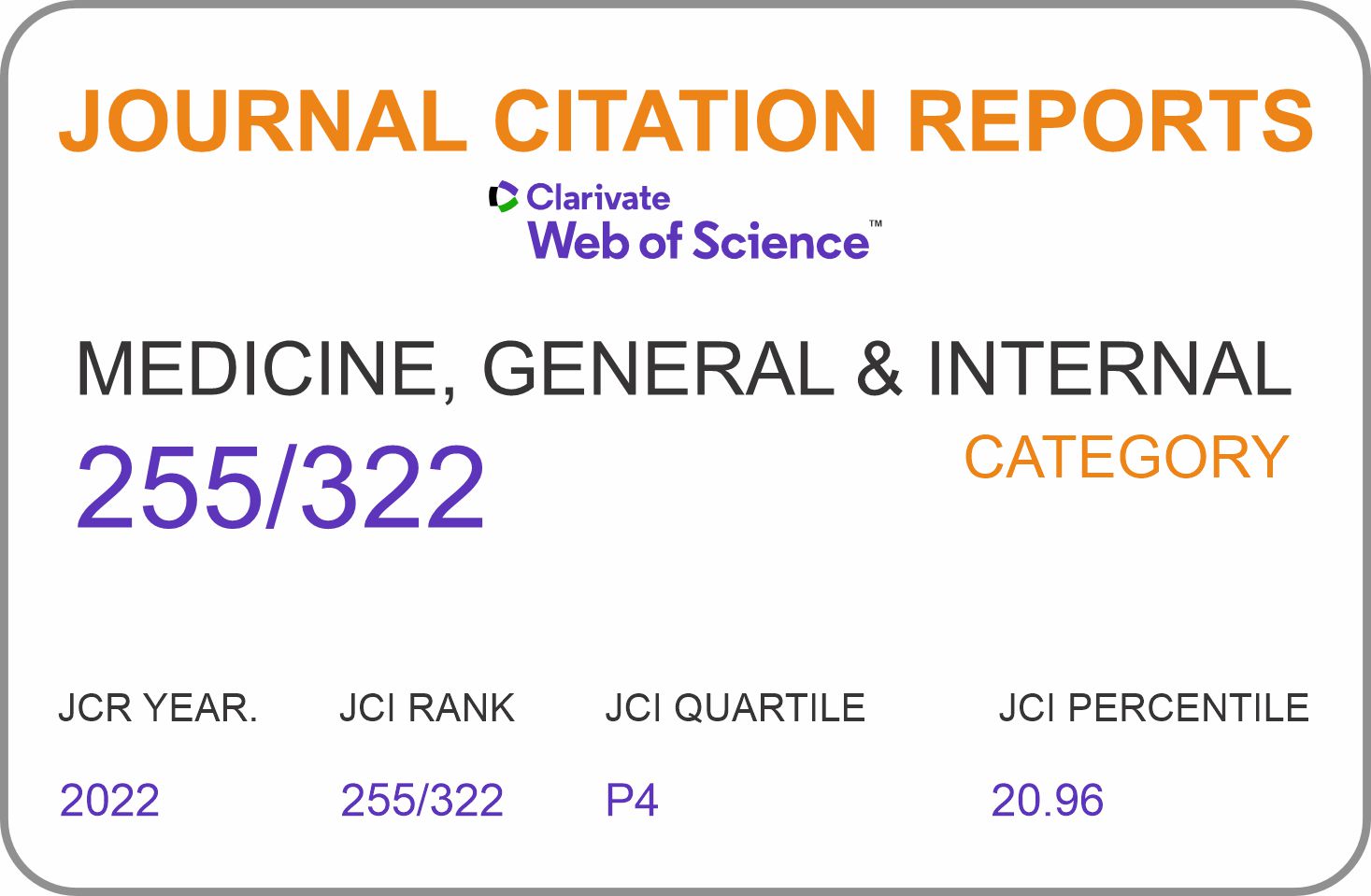The fate of the original rejected articles. Analysis in a public health journal in Latin America
DOI:
https://doi.org/10.35434/rcmhnaaa.2022.154.1548Keywords:
Publications, Systems for Evaluation of Publications, Bibliometrics, Scholarly Communication , Peer Review, ResearchAbstract
Introduction: Research published in scientific journals allows generating evidence for decision making. However, the destination of the research received in a scientific journal is not always its publication.
Objective: To determine the destination of the original articles that were rejected in the Peruvian Journal of Experimental Medicine and Public Health (RPMESP) during 2014 and 2015 and the factors associated with their publication.
Materials and methods: During June and July 2019, a Google Scholar search was carried out for the original articles that were rejected in the RPMESP, the gender, origin and academic degree of the corresponding author were evaluated as independent variables, in addition to whether he rejected was made by the editorial committee or after being reviewed by peers. To determine the associated factors, bivariate (RR) and multivariate (RRa) relative risks were calculated with 95% confidence intervals (95% CI) using a simple and multiple Poisson regression model.
Results: Of 285 original articles rejected, 45.6% were destined for publication in other scientific journals, of which 61.5% were foreign journals, the corresponding authors with foreign affiliation (RRa 1.34, CI 95%: 1.02-1.77) and undergraduate students (RRa 1.56, 95% CI: 1.12-2.17) increased the probability of publication, but it decreased if the rejection was after peer review (RRa 0.71, 95% CI: 0.52-0.97).
Conclusions: Less than half of the original articles that were rejected were destined for publication in another scientific journal. The authors must analyze the reasons for the rejection and continue with the publication process.
Downloads
Metrics
References
Turcotte C, Drolet P, Girard M. Study design, originality and overall consistency influence acceptance or rejection of manuscripts submitted to the Journal. Can J Anaesth. 2004;51(6):549-56. doi: 10.1007/BF03018396.
Bosch X, Alfonso F, Bermejo J. ¿Por qué se ha rechazado nuestro artículo? Rev Esp Cardiol [Internet]. 2002 [citado 1 oct 2019];55(7):782-3. Disponible en: https://www.revespcardiol.org/es-por-que-se-ha-rechazado-articulo-13034198.
Matías-Guiu J, García-Ramos R. El factor de impacto y las decisiones editoriales. Neurologia [Internet]. 2008 [citado 19 oct 2019];23(6):342-8. Disponible en: https://dialnet.unirioja.es/servlet/articulo?codigo=2672861.
Avanzas P, Bayes-Genis A, Pérez de Isla L, Sanchis J, Heras M. Destino de los artículos originales rechazados en Revista Española de Cardiología. Rev Esp Cardiol. 2015;68(3):254-64. doi: 10.1016/j.rec.2014.11.010.
Matías-Guiu JA, García-Ramos R, Castellanos M, Martínez-Vila E, Matías-Guiu J. ¿Qué ocurre con los artículos médicos remitidos en español que no son aceptados para publicación? Neurologia. 2013;28(4):205-11. doi: 10.1016/j.nrl.2012.05.002.
Ray J, Berkwits M, Davidoff F. The fate of manuscripts rejected by a general medical journal. Am J Med. 2000;109(2):131-5. doi: 10.1016/s0002-9343(00)00450-2.
Romaní F, Cabezas C. Indicadores bibliométricos de las publicaciones científicas de la Revista Peruana de Medicina Experimental y Salud Pública, 2010-2017. Rev Peru Med Exp Salud Publica. 2018;35(4):620-9. doi:10.17843/rpmesp.2018.354.3817.
Arroyo-Hernández H, Huarez B. Tendencia y características de los manuscritos recibidos y rechazados en la Revista Peruana de Medicina Experimental y Salud Pública entre 2011 y 2017. Rev Peru Med Exp Salud Publica. 2019;36(2):281-7. doi: 10.17843/rpmesp.2019.362.4190.
Mayta-Tristán P, Mezones-Holguin E. Aclaración editorial. Rev Peru Med Exp Salud Publica [Internet]. 2009 [citado 10 oct 2019];26(3):411-2. Disponible en: http://www.scielo.org.pe/scielo.php?script=sci_arttext&pid=S1726-46342009000300025.
Toro-Polo M, Pereyra-Elías R, Nizama-Vía A, Ng-Sueng LF, Vélez-Segovia E, Galán-Rodas E, Mayta-Tristán P. Publicación de los trabajos presentados a los congresos científicos de estudiantes de medicina, Perú 2002-2009: características y factores asociados. Rev Peru Med Exp Salud Pública [Internet]. 2012 [citado 10 oct 2019];29(4):461-8. Disponible en: http://www.scielo.org.pe/scielo.php?script=sci_arttext&pid=S1726-46342012000400007.
Beas R, Anduaga-Beramendi A, Rojas-Ortega A, Cisneros-Montoya A, Pereyra-Elías R, Mayta-Tristán P. Publication of Abstracts with Peruvian Affiliation Presented to the Annual Meeting of the American Society of Tropical Medicine and Hygiene 2006-2010. Am J Trop Med Hyg. 2019;100(4):1029-1032. doi: 10.4269/ajtmh.18-0168.
Abby M, Massey MD, Galandiuk S, Polk HC Jr. Peer review is an effective screening process to evaluate medical manuscripts. JAMA. 1994;272(2):105-107. doi:10.1001/jama.1994.03520020031008.
Chew FS. Fate of manuscripts rejected for publication in the AJR. AJR Am J Roentgenol. 1991;156(3):627-32. doi: 10.2214/ajr.156.3.1899764.
Hall SA, Wilcox AJ. The fate of epidemiologic manuscripts: a study of papers submitted to epidemiology. Epidemiology. 2007;18(2):262-5. doi: 10.1097/01.ede.0000254668.63378.32.
Armstrong AW, Idriss SZ, Kimball AB, Bernhard JD. Fate of manuscripts declined by the Journal of the American Academy of Dermatology. J Am Acad Dermatol. 2008;58(4):632-5. doi: 10.1016/j.jaad.2007.12.025.
Arroyo-Hernández H. Importancia de los encuentros de editores de revistas médicas especializadas. Rev Peru Ginecol Obstet. 2018;64(2):273-274. doi: 10.31403/rpgo.v64i2090.
Mejia CR, Valladares-Garrido MJ, Almanza-Mio C, Benites-Gamboa D. Participación en una sociedad científica de estudiantes de Medicina asociada a la producción científica extracurricular en Latinoamérica. Educ Med. 2019. Doi: 10.1016/j.edumed.2017.10.014.
Huaraca-Hilario CM, Apaza-Alccayhuaman A, Mejía-Alvarez C. Realidad peruana de la publicación científica estudiantil en los últimos diez años. Educación Médica Superior [Internet]. 2017 [citado 1 oct 2019];31(3). Disponible en: http://www.ems.sld.cu/index.php/ems/article/view/1019.
Vinther S, Rosenberg J. Fate of manuscripts rejected by a non-English-language general medical journal: a retrospective cohort study. BMJ Open. 2011;1(1):e000147. doi: 10.1136/bmjopen-2011-000147.
Wijnhoven BP, Dejong CH. Fate of manuscripts declined by the British Journal of Surgery. Br J Surg. 2010;97(3):450-4. doi: 10.1002/bjs.6880.
Downloads
Published
How to Cite
Issue
Section
Categories
License
Copyright (c) 2023 Hugo Arroyo-Hernández, J. Jhonnel Alarco

This work is licensed under a Creative Commons Attribution 4.0 International License.















